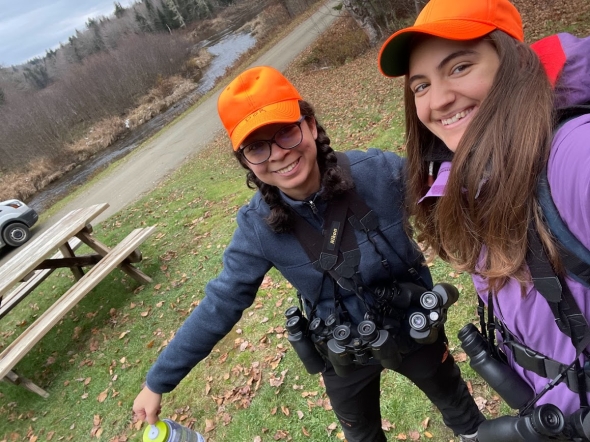

Kalina Duncheva


DOC Trip Leaders and How You Can Become One
DOC stands for Dartmouth Outing Club–a large club with many sub clubs dedicated to the outdoors. The DOC is "the oldest and largest collegiate outing club" in the US (you can read more about it here). The DOC organizes nature-centered trips with a focus on different activities every single day. There are ice-climbing trips, birdwatching trips, canoeing trips, and skiing trips.
But who leads these trips? That's what I am about to tell you.
This week I attended a Flora and Fauna seminar (FnF is a sub club of the DOC that focuses on birding and nature walks) for leaders in training, or saplings to use some FnF jargon. While I'm not planning yet to be a trip leader, many freshmen are already halfway through all of the requirements to lead a trip and will pretty soon be actual DOC leaders.
What exactly is the job of a DOC trip leader?
Trip leaders organize trips, put them up on Trailhead, where other students can sign up for trips, and actually take other students (called trippees) out on adventures. If you are a CnT leader (Cabin and Trail), you'll probably lead a lot of backpacking trips. If you're an FnF leader (Flora and Fauna), you might lead some tree ID trips. If you are a Winter Sports leader, you might lead a backcountry skiing trip to the Dartmouth Skiway. Trip leaders can also get van certified (i.e. you can drive one of the DOC vans, so you can take your trippees somewhere cool - header image shows trip leaders Ian and Levi, Ian is van-certified). They are also responsible for taking care of everyone's dietary needs, so when they're buying food, they have to look on Trailhead everybody's allergies and make sure everyone will have lunch.
When you first come to Dartmouth and join the DOC, you'll meet a lot of trip leaders. If you go to club meetings (as you should!), you'll also hear these leaders announce the trips they're leading out that given week. The first few weeks it's exciting, and you have no idea how these trip leaders manage to organize such adventures. By the end of your first fall or winter term, though, you start peeking behind the curtain and understand that it's not rocket science–and you can, too, become a trip leader.

So how do you become a trip leader?
Well, you need to attend a few seminars on group dynamics and risk management among other topics. You have to get a WFA (wilderness first aid) certificate or even a WFR (wilderness first responder) certification. If you are a Winter Sports leader, you might need to get AIARE certified (avalanche safety). The best thing is that all of these courses are subsidized by the Outdoors Programs Office.
Apart from all of these certifications, you also need to co-lead a few trips, so you learn from current leaders how to set up your trip on Trailhead, how to make sure everyone is safe and happy on your trip, and in general, how to embody the DOC's values in the outdoors.
There will also be other qualifications (like can you light a fire), but these depend on the specific club in which you want to be a leader.
Posts You Might Like

In one of my previous posts, I mentioned how I joined a sorority earlier this fall by going through the recruitment process. I've come a long way since then. In fact, I am living in my sorority house for my sophomore summer!


Dartmouth is not just a college. With world-renowned graduate schools, why would we choose to call ourselves a college instead of a university? The story behind that decision dates back to a significant Supreme Court ruling.


On a quiet spring Saturday in Hanover, I traded the usual campus buzz for Monet in the morning and archery in the afternoon—a reminder that Dartmouth weekends can be just as meaningful when they're slow, reflective, and a little unexpected.


Read on to learn about my sophomore summer experience.


During my sophomore spring quarter, I took on the challenge of four STEM courses, and while it has been intense, the unexpected connections across subjects and the joy of learning have made it one of my most rewarding academic experiences yet.


Hello finals week! As I close out a finals season, dive into my bag to see just what gets me through this time of the term!


My biggest recommendation during the college research process!


Read about the Sophomore Summer Soiree and how I got to witness the beginning of something that hopefully grows into a long-standing Dartmouth tradition!


A week of festivities at the NCAA Skiing Championship.
